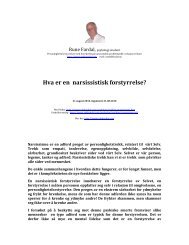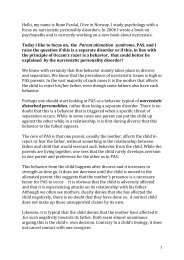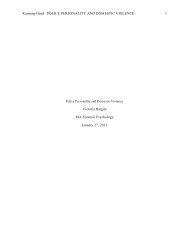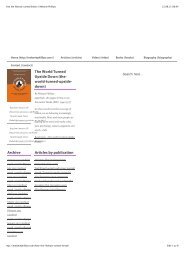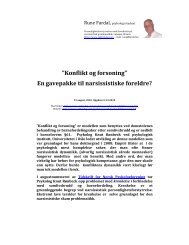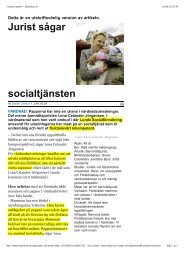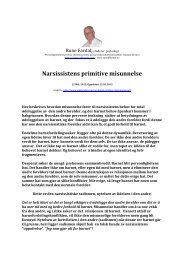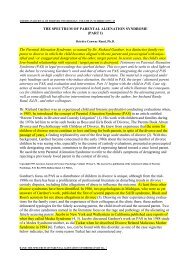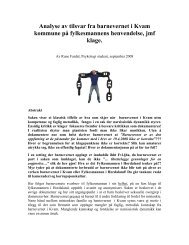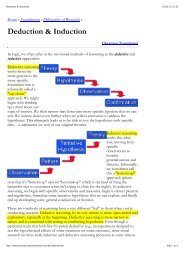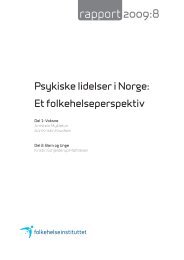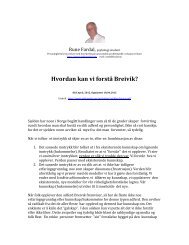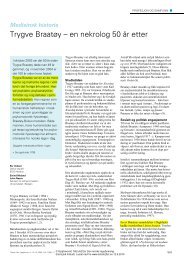The origins of narcissism and narcissistic personality disorder a
The origins of narcissism and narcissistic personality disorder a
The origins of narcissism and narcissistic personality disorder a
Create successful ePaper yourself
Turn your PDF publications into a flip-book with our unique Google optimized e-Paper software.
THE ORIGINS OF NARCISSISM 45<br />
the same phenomena according to their preferred theoretical constructs;<br />
(b) sampling bias, with Kernberg having treated more disturbed narcissists<br />
<strong>and</strong> Kohut having treated healthier individuals; <strong>and</strong> (c) interview<br />
bias resulting from differences between Kernberg’s confrontational<br />
stance <strong>and</strong> Kohut’s more empathic approach. Of these, the firstparadigm<br />
clash-is by far the most important.<br />
Because sampling <strong>and</strong> interview biases follow from paradigmatic<br />
assumptions, thoughtful research technique <strong>and</strong> design can control for<br />
the last two factors only to some extent. <strong>The</strong> belief that complex theoretical<br />
controversies can be resolved simply by appeals to supposedly<br />
objective data, as if data could be collected independent <strong>of</strong> the means<br />
<strong>of</strong> observation used <strong>and</strong> the research questions asked, or as if scientific<br />
knowledge could exist without some process <strong>of</strong> interpretation, is untenable<br />
(e.g., Grunbaum, 1984; Lakatos, 1970; Manicas & Secord, 1983;<br />
Putnam, 1990). Contrary to the arguments <strong>of</strong> several highly sophisticated<br />
thinkers in the tradition <strong>of</strong> Dilthey (e.g., Habermas, 1968/1971;<br />
Ricoeur, 1970; Schafer, 1976), the well-intentioned attempt to rescue<br />
the social sciences from positivism <strong>and</strong> reductionism by characterizing<br />
them as sciences <strong>of</strong> underst<strong>and</strong>ing or interpretation, rather than <strong>of</strong><br />
explanation, fails because it inaccurately characterizes natural sciences<br />
as objective or noninterpretative. Instead <strong>of</strong> permitting less rigorous<br />
st<strong>and</strong>ards <strong>of</strong> evidence in fields like psychoanalysis or psychology, a<br />
more cogent view therefore rejects positivism as an inadequate epistemology<br />
not only for the social sciences but for the natural sciences<br />
as well. Because all scientific knowledge is to some extent interpretative,<br />
the claim that psychoanalysis is only a hermeneutic <strong>and</strong> not also an<br />
empirical discipline really amounts to a rejection <strong>of</strong> the means by which<br />
scientists attempt to contain the influence <strong>of</strong> their interpretative biases.<br />
Reports <strong>and</strong> paraphrases <strong>of</strong> patient communications are just as dependent<br />
upon the investigator’s theoretical presuppositions as are the<br />
data <strong>of</strong> empirical studies but usually are gathered without observational<br />
controls <strong>and</strong> without the possibility for public critique, revision, or<br />
replication <strong>of</strong> findings.<br />
A lack <strong>of</strong> investigative controls is one reason, among others, that<br />
Grunbaum (1984) has argued that the validation <strong>of</strong> psychoanalytic<br />
theories requires extraclinical studies. Although transcripts <strong>of</strong> psychotherapeutic<br />
<strong>and</strong> psychoanalytic sessions likely also constitute adequate<br />
data sources for testing psychoanalytic hypotheses (Edelson, 1984; Luborsky<br />
& Spence, 1978), the continued appeal to uncontrolled case




